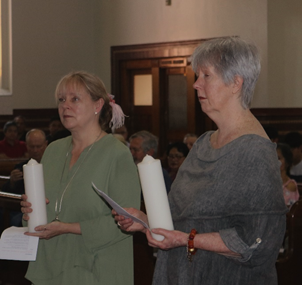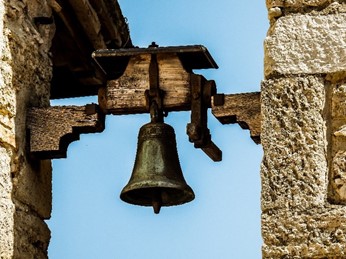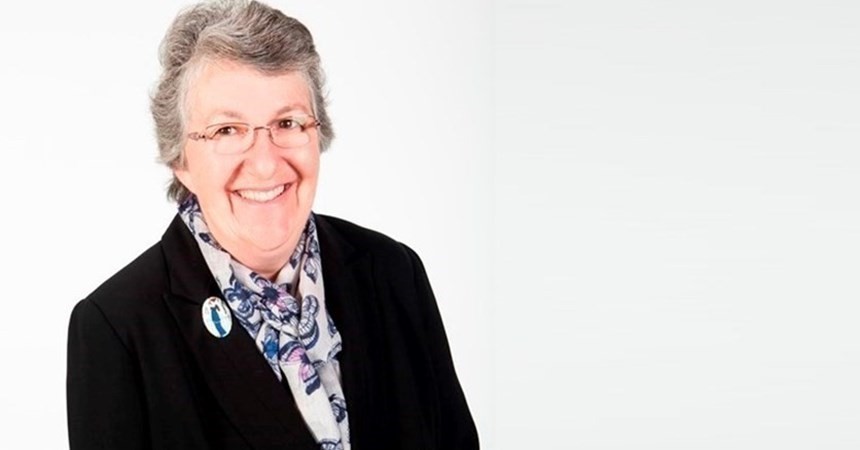 October 4 also marks the end of the Season of Creation which began on 1 September, and how blest we are to be living in Australia for this season, with the coming of Spring and its display of colours and new life, both in sight, feeling and sounds. I also thought of writing a reflection on nonviolence because October 2 is International Day of Nonviolence, however, I will save that up for next week’s message. It is also the commencement of Mission month with World Mission Sunday on October 18, so, that may form some of my message for that week. I am also very conscious that it is Mental Health month with its theme Tune In and World Mental Health Day is on Saturday October 10. This month’s edition of Aurora takes up the theme of Mental Health, reflecting on the Australian Catholic Social Justice Council’s Social Justice Statement – To Live Life to the Full – Mental Health in Australia Today. So you can see there was no shortage of ideas for my sharing with you this week or indeed this month.
October 4 also marks the end of the Season of Creation which began on 1 September, and how blest we are to be living in Australia for this season, with the coming of Spring and its display of colours and new life, both in sight, feeling and sounds. I also thought of writing a reflection on nonviolence because October 2 is International Day of Nonviolence, however, I will save that up for next week’s message. It is also the commencement of Mission month with World Mission Sunday on October 18, so, that may form some of my message for that week. I am also very conscious that it is Mental Health month with its theme Tune In and World Mental Health Day is on Saturday October 10. This month’s edition of Aurora takes up the theme of Mental Health, reflecting on the Australian Catholic Social Justice Council’s Social Justice Statement – To Live Life to the Full – Mental Health in Australia Today. So you can see there was no shortage of ideas for my sharing with you this week or indeed this month.
So, what have I chosen to write about? During the celebration of Mass today (Sunday), our two diocesan delegates for the Plenary Council were commissioned. Bishop Bill and Fr Andrew Doohan will be attending the Plenary Council in October 2021, as will both Bernadette Gibson and Helen Belcher. The first session of the Plenary Council was to begin this weekend but COVID – 19 has delayed it.
The commissioning began by my reading the following words from the Pastoral Constitution on the Church in the Modern World from the Second Vatican Council:
We are united in Christ and we are bound together with each other
carrying an essential word to all of humankind for its salvation.
We in the church are about the human situation
for we are not without bodies and our bodies are created by God.
Human history unfolds before us complete with triumph and tragedy.
Only with God can it come to its intended goal:
unity and love in Christ by the power of the Holy Spirit.
I have no doubt that most of you would recognise that the task of being a Plenary Council delegate is a significant and important one. We have been charged with tending the vineyard of the Lord (taken from the readings of this Sunday 27th Sunday in Ordinary Time). Bishop Bill’s focus in his homily for this Sunday focused on the second reading for the day, from St Paul’s letter to the Philippians (Phil 4:6-9). Bishop Bill spoke strongly about not needing to worry - if there is anything we need, pray for it, asking God for it with prayer and thanksgiving, and that peace of God which is so much greater that we can understand, will guard our hearts and our thoughts, in Christ Jesus.
In August 2020, Archbishop Timothy Costelloe SDB, the President of the Fifth Plenary Council of Australia wrote beautifully about - A Journey of Discernment – The Plenary Council (https://plenarycouncil.catholic.org.au/wp-content/uploads/2020/08/a-journey-of-discernment-The-Plenary-Council.pdf). I invite you to read this, slowly and carefully. In part of this, he speaks about Pope Francis choosing the name Francis after Francis of Assisi. He shared the following story and words:
 When Pope Francis’ namesake, Francis of Assisi, wandered into the ruined chapel of San Damiano in the countryside beyond the walls of Assisi and knelt before the crucifix, he heard a voice saying to him “Go and rebuild my Church for it is falling into ruin”. At first Francis thought he was being directed to rebuild the crumbling little chapel – and this he set out to do. He did not tear down what was left and start from scratch. Instead he sought to restore the chapel to its former beauty, and perhaps enhance that beauty, so that it was a place worthy of the Lord who dwelt within it. Gradually Francis came to realise that his vocation was about so much more. And so he decided to begin to live the gospel seriously and to model his life as closely as he could on the life and teachings of Jesus. His example soon attracted followers and a community formed around him – a community of people who, like Francis, wanted to live the gospel seriously. When the community began to experience opposition, as often happens when people try to live the gospel seriously, Francis went to Rome to seek the guidance and approval of the pope. He understood that he needed to remain within the Church if his living of the gospel was to be authentic.
When Pope Francis’ namesake, Francis of Assisi, wandered into the ruined chapel of San Damiano in the countryside beyond the walls of Assisi and knelt before the crucifix, he heard a voice saying to him “Go and rebuild my Church for it is falling into ruin”. At first Francis thought he was being directed to rebuild the crumbling little chapel – and this he set out to do. He did not tear down what was left and start from scratch. Instead he sought to restore the chapel to its former beauty, and perhaps enhance that beauty, so that it was a place worthy of the Lord who dwelt within it. Gradually Francis came to realise that his vocation was about so much more. And so he decided to begin to live the gospel seriously and to model his life as closely as he could on the life and teachings of Jesus. His example soon attracted followers and a community formed around him – a community of people who, like Francis, wanted to live the gospel seriously. When the community began to experience opposition, as often happens when people try to live the gospel seriously, Francis went to Rome to seek the guidance and approval of the pope. He understood that he needed to remain within the Church if his living of the gospel was to be authentic.
Francis was not asked to tear down the Church, imperfect and unfaithful though it was in many ways, and start again. Such an approach would, in a certain sense, emerge some centuries later in the Reformation. Francis was asked to rebuild the Church, to renew the Church, so that it could walk the path of fidelity more surely.
The decision to celebrate the Plenary Council might well, then, be understood as the “San Damiano moment” in the life of the Church in Australia. We are being invited to rebuild the Church, to restore it so that its true nature and identity, and its beauty, can be seen again. We are being called to walk together again the path of true fidelity. But if we are, together, to do this we need to understand the gift we have been given, rejoice in it, love it, and be ambitious for its future. (Page 6)
The fundamental question for the Plenary Council is: What do you think God is asking of us in Australia at this time? The foundational theme is this: Listen to what the Spirit is saying. We are all engaged in the ongoing effort, as the Catholic community in Australia, to seek to answer the question by engaging with what the theme invites us to do. The word “discernment” captures perfectly the task in which we are engaged, and to which we are called to continue to commit ourselves. There should be no doubt that God speaks to each of us in the depths of our hearts and is revealed to us in the midst of our own life experience.
During the commissioning, it was clear that we were invoking the Holy Spirit. The final commission prayer was:
In the power of the Holy Spirit, we send you forth on behalf of the Diocese of Maitland-Newcastle. Know that we are praying with you and for you.
Know that what we are asking of you is part of everyone’s journey of discernment for a more hope-filled Church.
Be confident that we are grateful for your willingness to represent this Church at the Plenary Council.
May God be present to you as the spirit of courage and right judgement, the spirit of knowledge and love,
as we walk together on the journey of faith.
To share with you some further words of wisdom from Archbishop Tim Costelloe:
How do we distinguish what we can do, and perhaps must do, to contribute to the rebuilding and renewing of the Church, from what we must not do because it will further weaken the Church? How can we be a constructive part of a renewed Church, and not initiators of a new church which would, in the end, be our own creation rather than God’s? The key lies in a careful consideration of what fidelity to the Lord and the Lord’s will for the Church really looks like.
Before I was ordained as a bishop, I taught theology both in Melbourne and at Notre Dame University in Fremantle. In one of my courses I used to speak of what I called a “three-fold fidelity” which was essential for any renewal of the Church. I would like to briefly address this question now.
I used to speak, and indeed still do, of three fundamental fidelities which need to always be in play, much like a juggler needs to keep three balls in the air and not allow one of them to fall to the ground. Those three fidelities are: fidelity to God’s self-revelation in Jesus Christ, made known to us in the Scriptures, and pre-eminently in the four canonical gospels, as those Scriptures are lived and believed in within the community of faith; fidelity to the ongoing presence and guidance of the Holy Spirit in the Church over the last 2,000 years in fulfilment of the promise of Jesus that the Holy Spirit would lead the disciples into the fullness of the truth (cf John 16:13)7 ; and fidelity to the presence of the Holy Spirit in the life of the Church, and the world, today, speaking to us in the signs of the times (the concrete circumstances of our individual and communal experience) as they are interpreted in the light of the gospel (Gaudium et Spes 4).(page 6 &7)
In these most uncertain times these three fidelities are our foundations for renewal and for rebuilding our church and hopefully our world. Please continue to be prayerful and gracious as we journey together as people of mission, humbly listening for what the Spirit is saying.

